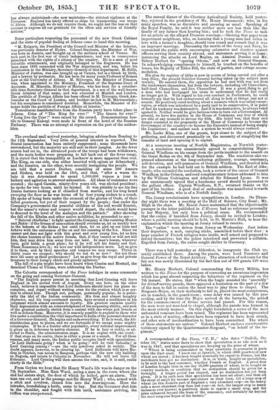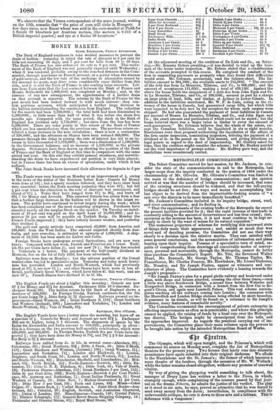A correspondent of the Times, "P. II.," who dates "
Suffolk, Oc- tober 18," states some facts to show that speculation is as rife now as it was in 1847, and that speculators are keeping up the price of wheat.
" Wheat is being accumulated in large quantities in granaries in ports upon the East coast. I know one at Ipswich, in which 6000 quarters of new wheat are stored ; it hasbeen bought nominally for export to France, but the merchants here get no destination. It is, in truth, -bought on speculation, to be sold to the best customer, whether French or English. A great firm of London bought thus in one day 10,000 quarters of wheat, to be bought in country markets, on condition that no destination should be given for a fortnight. A longer period has elapsed, and no destination hill yet been given. It is by such men that speculation has been set afloat ; and then all the shoal of small fry become 'peculators in their turn, till a large crop of wheat (in this Eastern part of England a very abundant crop—on the heavy soils a more abundant crop than last year—in fact, the largest crop in many instances ever known) is positively made to appear a small crop, and the price enhanced beyond the fears of the consumer, and certainly far beyond the moat sanguine hopes of the farmer."
We observe that the Vienna correspondent of the same journal, writing on the 15th, remarks that " the price of corn still sinks in Hungary. A few days since, new Banat wheat was sold in the corn-market at Pesth for 6 florins 30 kreutzers per Austrian metzen, (the metzen is 0.212 of a British imperial quarter,) and rye at 4 florins 30 kreutzers."



































 Previous page
Previous page